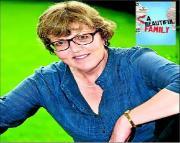
Cohen de Villiers' fictional work of sexual abuse in a Jewish family raises eyebrows SEXUAL abuse in Johannesburg's Jewish community seems an unlikely topic for a debut novel, but this one is hard-hitting and has the pace and verve of a thriller.
Yet this is what former journalist, and now public relations practitioner, Marilyn Cohen de Villiers has produced in A Beautiful Family.
Her main protagonists are South Africans Alan and Brenda Silverman. When they meet in the 1980s on an Israeli kibbutz, she is waif-like.
He's tall, blonde and a babe magnet with his charming ways and good looks. The kibbutznik girls are astonished when he falls for the tiny, childlike Brenda.
The first hint in the novel, which moves backwards and forwards across the decades, that something's not quite right, comes on the kibbutz when they make love. Alan tells Brenda, whom he clearly adores, to "just lie still and enjoy it". She obeys.
The book opens decades later in 2012, with the mysterious death of middle-aged Brenda in the couple's palatial and well-fortified Johannesburg home. She has no injuries, there's no blood, and two of their three grown-up children are at home. Until then, the Silvermans had seemed the perfect, Orthodox frum (devout) Jewish couple living a fairytale life.
A rookie reporter, Tracy Jacobs, is sent to cover the socialite's death. She starts to investigate its possible cause after the Silvermans' son, Yair, whom she knows from her schooldays, whispers an outrageous comment in her ear at the funeral.
Alan is a pillar of the community, a man with huge wealth and impeccable struggle credentials, having fled South Africa in the mid-80s rather than serve in the apartheid army. Furthermore, when the couple lived in London in the 80s and early 90s, he was a familiar figure in the exiled ANC elite as he promoted their cause.
Despite having been a journalist, Cohen de Villiers was shocked to discover there is abuse in the Orthodox Jewish community, when her husband, Poen de Villiers, alerted her to it years ago.
"Poen was a member of our local community police forum. He told me the police commander had mentioned a particular problem in our precinct ... domestic violence in the Orthodox Jewish community. Just like my husband, I was stunned."
Cohen de Villiers, friendly, assertive, at times forceful, had always believed - like too many others that sexual abuse was a social ill fuelled by poverty, ignorance and substance abuse. It didn't happen in the leafy suburbs, she believed, and certainly not in "good" Jewish families. She grew up "in a memorably happy family, where my parents were still holding hands after 58 years of marriage".
Some years after the revelation, a good friend of Cohen de Villiers died at a young age, in her sleep. It made the author take stock of her life.
"I questioned what I'd done to be proud of - besides having a great marriage and two lovely daughters."
She'd graduated from Rhodes University with a journalism degree followed by honours in English. "I'd always loved reading everything from Shakespeare to Thomas Hardy, Dan Brown to Jeffrey Archer."
So, she decided, the time had come to write a novel. Six months later she handed it to her creative writing teacher, Richard Benyon. He suggested she restructure it and remodel Alan to make his backstory more sympathetic. "I found myself wondering if sons were ever abused by their mothers, because we hear so often of fathers abusing daughters."
Cohen de Villiers began researching hebephilia, in which adults are attracted to children who are in the midst of puberty. She visited sites where academics and psychologists posted their findings, as well as ending up on internet chat rooms frequented by hebephiles.
"It was not a comfortable experience," she says, but it helped her to reconfigure her character, and rewrite her book. The result is an empathetic, insightful and sensitively drawn portrait of a sexual abuser in a family saga that takes place on three continents over 40 years.
The author has sited it in a Jewish family, "because that's my background. It's what I know."
Cohen de Villiers grew up in Johannesburg's northeastern suburbs, attended an 80% Jewish school and was in her third-year at varsity before she was subjected to overt antiSemitism. Her character, Alan, grows up in a Free State Afrikaans dorp where he's the only Jew at his school and spends the rest of his life wanting to belong. "I can understand that," says Cohen de Villiers.
"It's why Alan ensures that he and his family become Orthodox frum (a Yiddish word for devout or pious) Jews, and part of a supportive, caring community."
Cohen de Villiers is at pains to explain that her novel is pure fiction; none of the abuse is autobiographical. Nor does it relate to anybody she knows. She believes abuse flourishes because "the ultra-orthodox community is secluded, there is often no TV and secular books are not generally read. I am sure that women who are being abused are totally isolated.
Article by: Sue Grant-Marshall.
Article Source: Saturday Dispatch.

